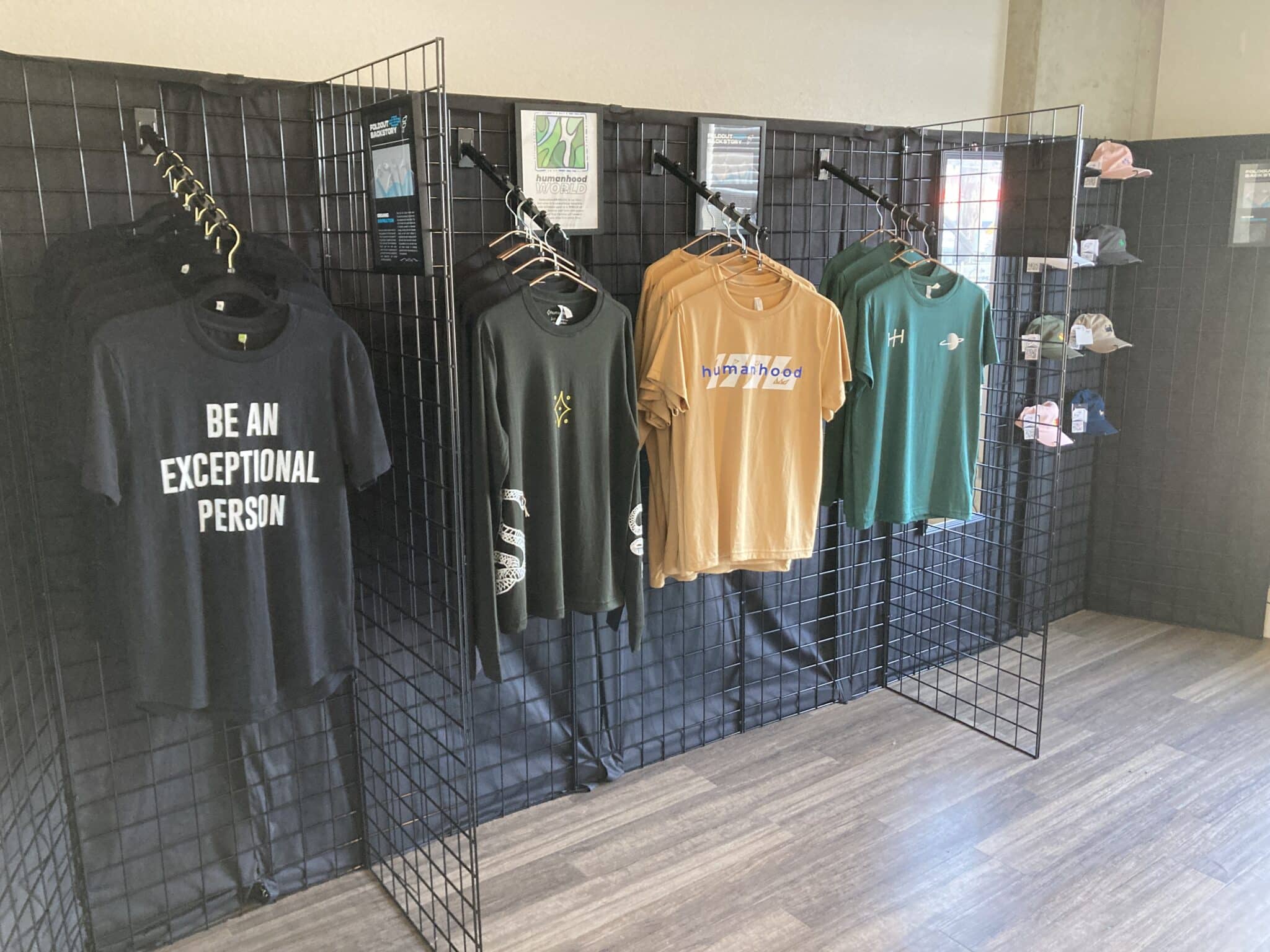
A mock setup of a Foldouts showroom. The company’s first store, a pop-up in RiNo, opens later this week. (Courtesy Foldouts)
John Fitzpatrick wants to change how you shop online.
He wants you to do it in person.
The 26-year-old has founded Foldouts, a showroom for e-commerce apparel brands. The company is launching the concept this coming weekend — the unofficial start of the holiday shopping season — with a pop-up shop at 2715 Larimer St. in RiNo.
“They (brands) are getting the benefit of having their own brick and mortar, but without the complexities of having to manage it,” Fitzpatrick said.
He said the shop on Larimer will have items from 10 different clothing brands, including local companies like Maroon Bell and Humanhood. But unlike traditional stores, customers won’t walk out with purchases. Instead, they’ll try clothes on and, if they want something, scan the QR code on the tag and order directly from the brand’s website.

John Fitzpatrick
“It’s the miniaturization of retail,” Fitzpatrick said. “I’m reducing that square footage … you don’t have to go through a checkout line, carry around bags, and everything is always in stock.”
Some online-only brands have had brick-and-mortar shops in recent years. Companies like Warby Parker and Untuckit have added stores locally. And cheeky local underwear brand Shinesty is taking space in the Cherry Creek Shopping Center after years of solely operating online.
Those companies, however, have signed leases directly. At Foldouts, each brand pays a fee based on the number of items they want in the shop. Fitzpatrick said he invested $10,000 in the pop-up, and when it’s over, he hopes to raise $1 million from investors to open the first permanent shop.
The goal is to eventually open three Foldouts in the Denver area, and expand past clothing brands to things like bedding or bags. Long term, he wants to open in other major cities.
The Philadelphia native moved to Colorado in 2020, and worked in supply chain design for brands such as Disney and Apple after majoring in packaging science at Rochester Institute of Technology. Fitzpatrick, who has always been passionate about sustainability, said he founded Foldouts because he wanted to decrease shipping materials and energy, and reduce carbon emissions.
He said Foldouts is a way to “de-grow” the supply chain, because brands can sell online and in store without changing how and where products are shipped.
“Businesses like when you can be sustainable and save a penny,” Fitzpatrick said. “With (Foldouts) it saves money, the environment because it’s less energy-intensive, and consumers are getting a special shopping experience.”
In addition to saving on things like real estate and shipping costs, Fitzpatrick said Foldouts reduces the amount of returns customers make. When bought online, he said clothes are returned about 45 percent of the time. When bought in store, the return rate is about 2 percent.
The name Foldouts comes from the old magazine advertising style, where one large advertisement folded out of the page.
“For an online brand, this is that kind of opportunity, this big immersive store for your brand, it’s almost like an ad in that sense,” Fitzpatrick said.
And, after people know their size for certain brands, they become consistent shoppers. Because of this, Fitzpatrick said Foldouts will frequently switch out which brands are carried in store, which he thinks shoppers will like.
“The vibe is to make what people like about fast fashion, which is it’s constantly new … but to provide that level of newness and change by simply switching out the brands,” he said.

A mock setup of a Foldouts showroom. The company’s first store, a pop-up in RiNo, opens later this week. (Courtesy Foldouts)
John Fitzpatrick wants to change how you shop online.
He wants you to do it in person.
The 26-year-old has founded Foldouts, a showroom for e-commerce apparel brands. The company is launching the concept this coming weekend — the unofficial start of the holiday shopping season — with a pop-up shop at 2715 Larimer St. in RiNo.
“They (brands) are getting the benefit of having their own brick and mortar, but without the complexities of having to manage it,” Fitzpatrick said.
He said the shop on Larimer will have items from 10 different clothing brands, including local companies like Maroon Bell and Humanhood. But unlike traditional stores, customers won’t walk out with purchases. Instead, they’ll try clothes on and, if they want something, scan the QR code on the tag and order directly from the brand’s website.

John Fitzpatrick
“It’s the miniaturization of retail,” Fitzpatrick said. “I’m reducing that square footage … you don’t have to go through a checkout line, carry around bags, and everything is always in stock.”
Some online-only brands have had brick-and-mortar shops in recent years. Companies like Warby Parker and Untuckit have added stores locally. And cheeky local underwear brand Shinesty is taking space in the Cherry Creek Shopping Center after years of solely operating online.
Those companies, however, have signed leases directly. At Foldouts, each brand pays a fee based on the number of items they want in the shop. Fitzpatrick said he invested $10,000 in the pop-up, and when it’s over, he hopes to raise $1 million from investors to open the first permanent shop.
The goal is to eventually open three Foldouts in the Denver area, and expand past clothing brands to things like bedding or bags. Long term, he wants to open in other major cities.
The Philadelphia native moved to Colorado in 2020, and worked in supply chain design for brands such as Disney and Apple after majoring in packaging science at Rochester Institute of Technology. Fitzpatrick, who has always been passionate about sustainability, said he founded Foldouts because he wanted to decrease shipping materials and energy, and reduce carbon emissions.
He said Foldouts is a way to “de-grow” the supply chain, because brands can sell online and in store without changing how and where products are shipped.
“Businesses like when you can be sustainable and save a penny,” Fitzpatrick said. “With (Foldouts) it saves money, the environment because it’s less energy-intensive, and consumers are getting a special shopping experience.”
In addition to saving on things like real estate and shipping costs, Fitzpatrick said Foldouts reduces the amount of returns customers make. When bought online, he said clothes are returned about 45 percent of the time. When bought in store, the return rate is about 2 percent.
The name Foldouts comes from the old magazine advertising style, where one large advertisement folded out of the page.
“For an online brand, this is that kind of opportunity, this big immersive store for your brand, it’s almost like an ad in that sense,” Fitzpatrick said.
And, after people know their size for certain brands, they become consistent shoppers. Because of this, Fitzpatrick said Foldouts will frequently switch out which brands are carried in store, which he thinks shoppers will like.
“The vibe is to make what people like about fast fashion, which is it’s constantly new … but to provide that level of newness and change by simply switching out the brands,” he said.
